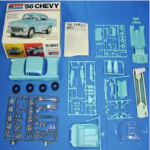 I guess my fascination with models started when I was very young. My dad used to love to work on model tanks of all things, and he was darn good at it. He would spend hours working on those models, meticulously putting together every piece, then every decal, and then finishing the job with his own camouflage paint combinations. He would put his finished products in my room, and I admired them so much, I decided to try it.
I guess my fascination with models started when I was very young. My dad used to love to work on model tanks of all things, and he was darn good at it. He would spend hours working on those models, meticulously putting together every piece, then every decal, and then finishing the job with his own camouflage paint combinations. He would put his finished products in my room, and I admired them so much, I decided to try it.
Together we went to the hobby store and after much discussion, I decided my first model would be a car. I eagerly opened the box and was greeted by sheets of connected plastic pieces, followed by a sheet of decals. The instructions were a little intimidating, but I couldn’t wait to get started!
The beginning was a lot of fun. The project was new, and coincidently, the first moves were easy. Between the excitement of starting, and the large initial pieces I was snapping together, I immediately dubbed myself an expert model builder. Within twenty minutes, my car began to surprisingly look like the car on the box I had propped up next to my workstation!
But then the project slowed down. The pieces got smaller, and it became increasingly more challenging to work with the small parts that were the finishing touches. The project became less fun, and in order to finish it, it took a discipline I hadn’t yet acquired. My momentum was gone, and I lost interest. The pieces laid scattered on the rug, waiting for me to return and finish up the project. I put my plastic green car, missing the final steps like the decals and the paint, next to my dad’s beautiful tanks. It was a painful example of my inability to finish what I had started.
Does this story sound familiar? Many tasks that are challenging follow a similar pattern. There are always the initial first steps that are fun, easy, exciting, and fill us with hope. But it’s the final little pieces that truly challenge us and take us to the next level. Those little pieces are the finishing touches, and the ones that transform our projects from good to great. It is those final little pieces that teach us that we must remain diligent and disciplined to complete the task. There are a number of scenarios that might occur if you don’t keep the focus and attention to detail all the way to successful completion:
- You are not just working on a document, but editing that document multiple times to get it just right.
- You are not just creating a business plan, but rewriting that business plan multiple times. You want to do more than follow the plan for one month; you methodically follow the plan for several months.
- You’re not just coming up with an idea to transform you or your business, but meticulously executing that idea into a well thought out plan of action.
No one enters into a challenging scenario with the plan to quit. The big pieces bring us hope, but it’s the little pieces that are commonly underestimated. As the proverb goes, “forewarned is forearmed.” By reminding yourself that you don’t want to lose steam on the smaller, less obvious tasks of a larger project, you can be better prepared if it happens. It is a common, often unconscious, behavior, so your mindfulness is key. That means understanding that the small pieces, the ones that take so much more time to complete, may very well define who you are. Prepare for them, plan for the time and effort that is required to address them properly, and finish them, because it’s those small pieces that count the most.
 Is now the time for you to develop YOUR speaking business? Sign up and join me for four Monday evenings in the month of October at The Writer’s Center in Bethesda, Md. First session is Monday, October 7th!
Is now the time for you to develop YOUR speaking business? Sign up and join me for four Monday evenings in the month of October at The Writer’s Center in Bethesda, Md. First session is Monday, October 7th!

Well, I think this Blarticle was written for me – I know I struggle with the finishing touches – whether it’s about finishing the clean-up of our garage or handing in a report a little too quickly. Thanks, Rob, for pointing out something that can be addressed & should be! Thank you!
Believe me, I’m still working on this one myself. But becoming more aware of our tendencies certainly helps! Thanks for posting Ron.
Great article! Rob, thanks for the wisdom from your story – how small things/pieces matter. Without getting many small things done, any big projects won’t be accomplished. On the other hand, sometimes, we also need to break down a big project into multiple small tasks.
Good point. The time management gurus used to refer to this as the “Swiss Cheese Method” because they would encourage taking larger tasks and poking holes in it by breaking it down. Thanks for posting Hui!
In 2012, I began building a new home to replace the one lost in a tornado. I hired a good carpenter to help me and I subbed out a few things like drywall and the steel roofing. I still have a small list of minor tasks to finish, five years later.
I can attest to the wisdom of this Blarticle in the clarity of hindsight. You are spot on, once again!
But having worked with you some 25 years ago, I remember this about you: It may take you five years to complete those minor tasks but you WILL finish! So nice to hear from you Joe.